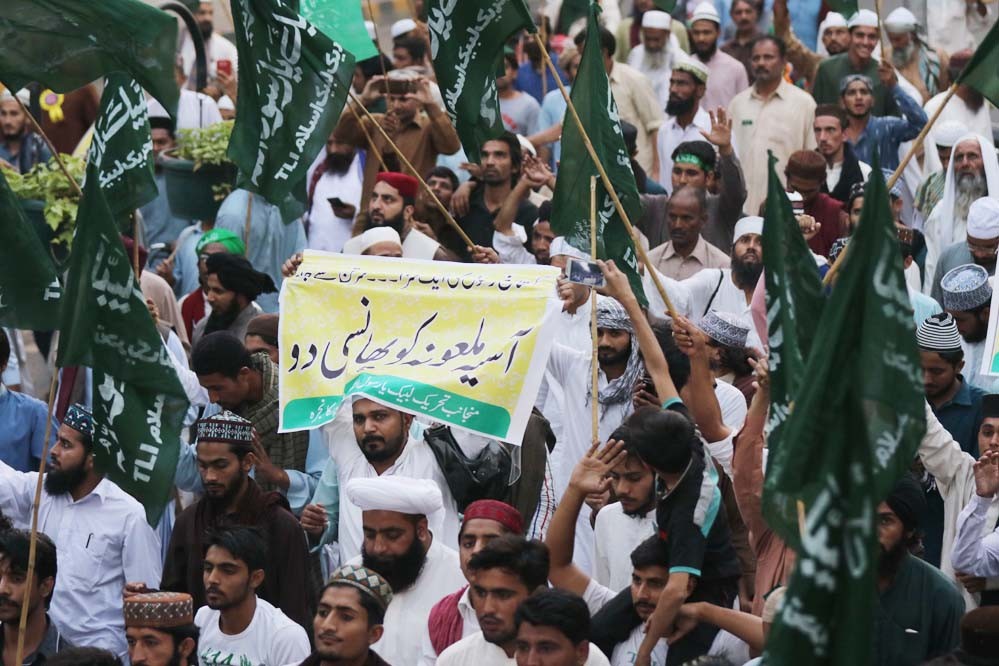
Are the blasphemy laws legal-political trickery or a genuine protection of sentiment?

Prime Minister Imran Khan has been seeking refuge in non-controversial hygiene politics. Sweeping the streets makes for a good photo-op and a metaphoric point about brushing policy failures under the carpet. Nero’s fiddle has been replaced by a broom.
The confused PTI government is bumbling through self-inflicted crises but at some cruel expense, these will plateau out. It is the PTI’s surrender to religious political blackmail and removal of Atif Mian that will keep haunting them. This explains the government’s silence over the open threats by the Tehreek-e-Labbaik Pakistan, calling for the murder of judges if they acquit Asia Bibi, the Christian woman accused of blasphemy and whose final appeal was recently heard by the Supreme Court.
Given Imran Khan’s historic sympathies with Taliban, refusal to amend the Zina law, attraction towards the Difa-e-Council Pakistan lobby, disqualification of Atif Mian and now, reluctance to reform the blasphemy laws, the hope for government protection for citizens at the mercy of religious outfits is nil.
Although, military dictators and civilian governments have exploited religion equally for political expediency, the post-War on Terror period convinced many to review the place for religious and clerical politics in Pakistan. The PTI didn’t get the memo, it seems.
Women and religious minorities are vulnerable citizens who live under unequal power dynamics. Laws against blasphemy and sexual harassment exist but justice is not just application of law but also about understanding the social preconditions in which these offenses are committed and who benefits from their commission.
Before its reform, the discriminatory Zina law enabled collusion between Muslim men and the state, to control and take punitive measures against women’s sexuality, mobility and choice. It made a vulnerable victim into a criminal herself. The legal script rehearsed the same social biases that also influence jirga decisions and honour crimes and which consider women’s defiance to be a punishable grievance against men.
Similarly, Pakistan’s blasphemy laws effectively protect (the sentiments of) the powerful religious majority from vulnerable minorities. Even the in-between status of Ahmedis as neither sect nor minority, is considered a grievance against the majority. On accusations of blasphemy, the diagnoses by scholars and analysts remain conflicted. Some argue that blasphemy is simply a non-religious cynical tool and others insist that it genuinely wounds Muslims universally. Are the blasphemy laws legal-political trickery or a genuine protection of sentiment?
Those who argue that the blasphemy law can be de-weaponised if it is proven that the offence doesn’t exist in religious texts, are missing the point. The technicalities of the law or doctrinal history do not matter anymore. Millennials are immersed in the politics of sentiments and they prioritise social reparation over, or equate it to, legal justice. The long tradition of satire is not based on the factual - it is the exaggeration of fact - but it is now translated as a tangible secular attack because religious hurt itself has become an indisputable ‘fact’. Mockery, words and images are not received as critique but actual profane attacks that cause sentimental injury.
South Asian colonial history bears testament to how the blasphemy law (295A) has always been a political weapon rather than a religious policy. Macaulay’s decision to legalise and police religious sentiment through this law allowed the colonial administration to manage the enmity it stoked between Hindus and Muslims.
Throughout the communalising 1920s, Hindus ran religious purification campaigns while Muslims ran tableeghi ones to literally increase the census through conversions, so as to gain electoral advantage. The campaign depended on belittling each other’s faith and spreading fear of each other as sexual predators. This had an obvious impact on veiling, suspicion and distancing between the two communities. It legitimised separate electorates. Conversion and secularisation cause anxiety to male religious leadership because they limit the use of women and minorities for political benefit.
The case of Rajpal’s pamphlet that spread insinuation about Muslims’ perverse sexuality led to his trial for blasphemy in 1924 and subsequent acquittal in 1927. Organised protests in Lahore demanded the removal of Justice Singh who found that the pamphlet did not cause "hatred between the classes" and opined that the law protected living persons of religious communities, not deceased religious leaders. There was no violence and the matter ended but two years later, when Rajpal was murdered by a devotee, Ilmuddin, it was Jinnah who pleaded an unsuccessful defense for the killer in Lahore. He did not excuse the act of murder but instead, appealed for mercy for a crime of devotion.
The legal script of blasphemy is historically bound with inter-communal politics under the rule of Empire. In modern democratic nation states, the script has unravelled and is followed by sentimental ad-libbing. Today, it is not just the clerics but politicians, TV anchors, lawyers and even judges who proudly refute their neutrality and boast of their own majoritarian biases.
In cases of blasphemy or sexual harassment, justice cannot be about empathising with the ‘wronged’ powerful, especially when mere allegations are enough to consider a non-Muslim guilty but not enough to believe that a woman was harassed. To reset this imbalance between aggrieved Muslim men and the suspect offenders/entrappers means that, justice must account for the unequal status of women and minorities in the legal script and in society.